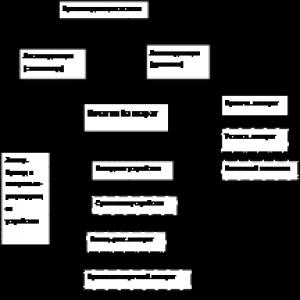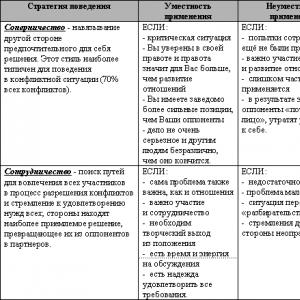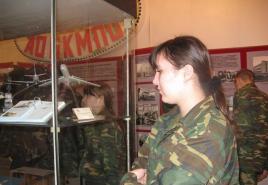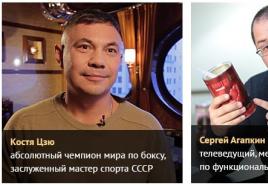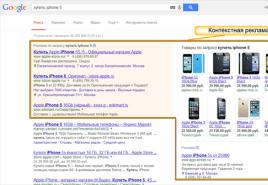What is a thesis and examples of abstracts for writing. A quick guide to writing a thesis What is a thesis in Russian examples
The scientific term "thesis" is familiar to every student of various educational institutions. This is the result of a study written by in the form of a summary. Typically, the volume of such a presentation is approximately 2 pages of printed text. Many people know the meaning of this term, but not everyone knows how to formulate and correctly present the results. But it's easy to fix.
Abstracts can be called a small scientific article that incorporates the main provisions of the study. This is the business card of your main work. In most cases, they are written for a scientific conference, where the student needs to clearly state the essence of his work in the form of a report. There are certain design rules that must be followed, as well as the structure of writing.
In contact with
Structure
In the abstract, you summarize covering only one topic, chosen together with the leader. You need to write only about personal achievements or developments during the study, taking into account all its participants, if there are any other than you. Like any other written text, the abstract consists of certain sections:
- Introduction. Here you need to very briefly describe the reason for the study. By the introduction, the reader should immediately understand what is at stake and why it is important. From this follows scientific novelty, without which this work will be ordinary. Usually the introduction takes no more than one paragraph.
- Theoretical part, in which the thesis should reflect the most basic aspects relating to theory, so that the reader has a clear idea of the subject and object of the study. Extra statements in this part are not welcome, as they will be presented in the main report anyway.
- The main part, which again summarizes the analysis of the study. When stating certain facts, the author must always back up with arguments. Therefore, he must think in advance how to formulate the thesis.
- Conclusions formulated on the basis of the obtained analysis. Always ask yourself why you came to these conclusions. In conclusion, we can again briefly mention the introduction and scientific novelty in the past tense. An example of the phrase: “And so we justified ...” will fit perfectly.
- . It is important to pay attention to the correct design, since a common mistake is precisely an inattentive attitude to the design requirements. The supervisor usually clarifies this point with the student.

Abstract types
Exists three types of writing:
- formulating a concept for posing a problem;
- the result of the study;
- introduction of a new method of work.
Statement of the problem can be called the most unstable genre. Whether your abstracts will be included in the collection or not depends on how much your description of the problem will please the curator. If it seems to him that you were not convincing enough, they will not be published. Therefore, it is worth taking into account all aspects of the work, even what kind of supervisor you have.
Abstracts in literature
 Few people think about what a thesis is in literature. But this is quite an interesting point, which can not be compared with the traditional understanding of the concept.
Few people think about what a thesis is in literature. But this is quite an interesting point, which can not be compared with the traditional understanding of the concept.
In ancient Greece, writers called the thesis falling phase.
To the question of what a thesis is, one can only answer that these are briefly and clearly formulated thoughts set forth in one sentence. Such concepts are used to write essays. With regard to versification, this term refers to the moment when the narrator uses short syllables, lowering his voice while reading the poem.
How to write?
In order for the writing process to take place without any difficulties and to be competent in execution, you must follow certain algorithm of actions:
- The first thing to do is to decide which text you are writing the abstract for. In them, for the report, all the information is presented very briefly, rewriting absolutely everything from scientific work will be the wrong approach to the task.
- After that, you should re-read your report, identify the relevance of the work and its purpose.
- To understand and formulate the issues raised in the scientific work.
- Next, you need to justify your choice regarding the issue.
- Describe research methods, if possible - offer your new methodology.
- Formulate conclusions.

Important! Abstracts for the article you can write either on the chosen topic, or pick it up to already written works and come up with a title. Any way of writing is valid. But in any case, everything will depend on the curator who will guide you and choose the way of writing for a scientific conference.
Thesis plan
The thesis plan will, if done correctly, be a good assistant in writing any scientific text. It should express the essence of the study, specific aspects and bare facts. Without a thesis plan, all the author's arguments given in a scientific work lose their weight. From all of the above, we can conclude that abstracts are written both for finished work and for completely unfinished work.
Important! Abstracts are a separate genre of scientific writing, and the thesis plan is their faithful companion.
 The thesis plan should be of a debatable nature, that is, it should cause a response or dispute among the listeners. This can be called a kind of announcement, a warm-up before submitting the main work and information on scientific topics. The listener will already know what exactly will be discussed in the report, and so on.
The thesis plan should be of a debatable nature, that is, it should cause a response or dispute among the listeners. This can be called a kind of announcement, a warm-up before submitting the main work and information on scientific topics. The listener will already know what exactly will be discussed in the report, and so on.
The thesis plan can also be drawn up for literary texts. Usually such tasks are given to schoolchildren, not students. Students formulate abstracts and a thesis plan for good writing Literature or Russian. In this case, the theses will no longer be a scientific essay, but clearly formulated thoughts, which subsequently need to be argued in the essay.
Now the question: “What are abstracts and how to write them?” will no longer cause you any difficulties. They can be formulated both for scientific works and for works of art, and these will be two completely different types of written works. But, if you follow a clear algorithm of actions, it will be easier to complete tasks. And examples of writing will allow you to clearly understand the structure and how to correctly compose them.
What is a thesis
Preparation for writing
Publication date: 02.12.2016
Any essay must begin with the construction of a plan, but for this it is necessary to learn how to formulate a thesis.
The thesis is not an introduction, do not confuse. The thesis is the main idea of the introduction, which is placed in one (maximum two) sentences, expresses your personal opinion, and is written at the very end of the introductory part of the essay. It is to the thesis that we select the arguments.
All topics of the essay can be divided into three groups:
- Nominative sentence (keywords)
- Question
- Quote
Depending on this, the topic needs to be disclosed in different ways.
Let's start with keywords. Such topics serve as a ground for reflection, but do not require a specific outcome, that is, you can move in any direction and come to any thesis, the main thing is to rely on keywords.
Example:
Theme: Mom's love
Thesis: I believe that mother's love is the strongest feeling in the world.
Arguments: “Daughter of Bukhara”, “Mother of Man” (mother loves the child no matter what and is ready for anything for him)
You can come to another thesis: It seems to me that excessive love for a child can harm him.
Argument: “Undergrowth” Mother spoiled her beloved son, did not see any shortcomings in him, and he grew up ill-mannered and selfish.
Theme: Taste of Victory
Thesis: It seems to me that victory does not always bring joy, sometimes it tastes bitter
Arguments: “The dawns here are quiet”, “The fate of man” (Heroes defeated the Nazis, but at what cost? The joy of victory mixed with grief for loved ones), “Hero of our time”, “Eugene Onegin” (Pechorin and Onegin won the duel but it did not bring them joy)
Subject: The price of a mistake
Thesis: I think that by making a mistake, people risk paying for it with the highest value on earth - someone's life.
Arguments: “Sasha” (Due to Volodya’s inexperience, half of the platoon died), “Eugene Onegin” (Onegin, without thinking about the consequences, provoked Lensky into a conflict, which led to the death of a friend)
Thesis: I think that by making mistakes, people risk paying for it with their own happiness.
Arguments: “Hero of our time”, “Eugene Onegin” (the heroes realized love late, which they greatly regretted)
Now let's deal with the topic-question. Questions can be open (it cannot be answered yes or no. For example, when will you arrive? What time is it? Etc.) and closed questions (you can answer yes or no. Will you come?
If as a topic you got open question, then you just need to answer it. The answer will serve as the thesis.
Topic: How to choose in a difficult moment between honor and dishonor?
Thesis: I think that the choice will depend on how much honor is dear to a person.
The thesis can be formulated differently: It seems to me that, being in a difficult situation, a person must decide whether he can live in peace, having committed a dishonorable act.
Arguments: "The Captain's Daughter" (Grinev was ready to die, and Shvabrin preferred to become a traitor), "Sotnikov", "The Fate of a Man", "Sasha"
If met as a topic closed question, then you need to explain your answer (yes, because ... / no, because ....). An explanation of the answer is required, otherwise the topic will not be considered open.
Topic: Can a person always control his actions?
I think being under the influence of emotions/feelings a person loses control over himself
Arguments: "Lady Macbeth", "Eugene Onegin" (Lensky, in anger, without thinking, challenged Onegin to a duel), "Mozart and Salieri" (Envy overshadowed Salieri's mind, and he poisoned a friend), "The Captain's Daughter" (Shvabrin was possessed hatred and vengeance).
The most difficult topics, in my opinion, are quotes. For myself, I divided the statements of the greatest people into “understandable” and “incomprehensible”.
In the first case, it is enough to mentally agree with the author and explain why you agree.
IMPORTANT!!! in no case do not write in the essay the phrase: “I agree with the author ...”, this is the final essay, not the exam. This option is only acceptable if you have absolutely nothing else to write.
Topic: Youth is a time for mistakes.
The quote is quite simple: in youth, a person makes most of the mistakes. And why? The answer will be the thesis.
Thesis: I think that most of the mistakes a person makes in his youth, because at this age we enter adulthood, but we have absolutely no experience.
Arguments: "The captain's daughter" (Grinev escaped from the supervision of his parents, got drunk, lost money, offended Savelich, but received a lesson for life). "Ionych" (Young Katya believed that a career was more important than a family, but she was mistaken)
But there are also complex quotes, the meaning of which is difficult to understand, or it is difficult to find an argument. In this case, the statement needs to be “deciphered”, translated into an accessible language. Then there are 2 ways: either “decoding serves as a thesis, or we rely on the phrase that we got, and the thesis is an explanation.
Theme: Love is a magical flower, but you have to be very brave to go to the edge of the abyss and pluck it.
The edge of the abyss is a risk
Picking a flower means falling in love
And what is the risk of a man in love? He risks not getting reciprocity and being left with a broken heart.
So we write in the thesis: I believe that only a brave person can fall in love, because he risks being left with a broken heart.
Arguments: "Garnet bracelet", "Lady Macbeth", "Sunstroke". You can write about Pechorin, maybe he closed himself from feelings because he was afraid?
After you have formulated the thesis, you can proceed to the next step -
Whether you are preparing a short essay or an entire doctoral dissertation, probably the most difficult part of the job will be preparing the thesis. And this article was created just to help you in this difficult matter.
Steps
The right choice of abstract statements
- Question:"What are the advantages of using computer technology in the classroom of the 4th grade of the school?"
- Thesis:"Computers allow fourth-graders to start acquiring technological and scientific knowledge at an early stage."
- Question:"Why the Mississippi River plays such an important role in Mark Twain's book" The Adventures of Huckleberry Finn"?"
- Thesis:"The river symbolizes both division and progress at the same time, as it separates the characters and the area, but it also provides the best chance for Huck and Jim to get to know each other better."
- Question:"Why are people so annoyed by vegans, feminists and other 'morally oriented' populations?"
- Thesis:"After careful sociological research, we found that people feel that members of 'morally oriented' groups look down on others as 'second class' people, and this actually provokes anger and conflicts from scratch."
-
Tailor your abstract to the type of document you are writing. Not all essays are written for the purpose of persuasion or education. Understanding the purpose of writing a document will help you choose the best abstract for it.
To make your talking points seem more powerful, express a clear position with them. You must address one specific issue in detail so that all your statements can be substantiated by the contents of the document being prepared. Consider the examples below.
Find arguments you've never heard of before. The best theses allow you to find a new unusual way to look at the topic under consideration. They are fresh and dynamic, which makes the essay itself fresh and dynamic.
- "After you come across Huck Finn self-flagellation for the third or fourth time, you realize that, in fact, he is the first literary character who is a notorious sadomasochist."
- "The advent of the Internet has largely rendered copyright laws meaningless - everyone can and should be able to read books for free, watch movies, study art and download music for free."
- "The latest research suggests that America needs to get rid of (quickly) the two-party political system, despite the fact that it has served the country well over the past couple of centuries."
-
Make sure your thesis is provable. Do not come up with a thesis, only to check its validity later. The thesis is the end point of your research, not the beginning. You need statements that you can back up with evidence.
- The following are examples of good abstracts.
- "By recognizing the existence of impossible contradictions, considering them and then questioning them, Blake gives birth to his own faith and gradually strengthens it. Ultimately, the only possible way to gain faith in his poems is to temporarily lose it."
- "According to his well-documented philosophical views, an existential society that has no idea of the past or the future is doomed to stagnation."
- "When reading Ode to a Nightingale through the lens of modern deconstructivism, one can notice that Keats saw poetry as a kind of changeable subjective, and not a rigid literary form."
- The following are examples of bad abstracts.
- "The wrong people won the American Revolution." Despite the fact that this thesis looks unusual and unique, it will be very difficult to prove who was "right" and who was "guilty", so the statement in question is extremely subjective.
- "The theory of genetic inheritance is a restrictive theory for any human relationship." The phrase sounds too complicated and pretentious. And the taken scale of "any human relations" is too wide.
- "Paul Harding's novel is ultimately a cry for help from a clearly depressed author." Since you personally did not have a chance to thoroughly ask the author about everything, just as there are no other lifetime sources with such information, you will not be able to prove what can be considered a fact here and what can be conjecture.
- The following are examples of good abstracts.
-
Limit abstract statements to one or two sentences. Abstracts should clearly and to the point state the main idea, this will help the reader understand the topic and the way it is presented in the document, as well as your attitude towards it.
First, ask yourself a question, and make the answer to it a thesis. Regardless of how complex the topic you are considering, almost any abstract can be presented in the form of answers to certain questions.
Secrets of preparing the perfect abstract
Choose a topic that interests you. This is the first step in preparing a paper and abstract for it, as all the content of your work will be based on the topic you have chosen. Unfortunately, this step will have to be omitted if you do not have the opportunity to choose a theme yourself.
Study the topic comprehensively. The purpose of this step is to select a specific, narrow aspect of the topic that you will be able to discuss. For example, you can choose computers as the theme. Computers can be viewed in terms of their hardware content, software, and programming. However, such broad areas are unlikely to become the basis for the preparation of good abstracts. Whereas something narrower, like the influence of Steve Jobs on the modern computer industry, will allow you to have a much clearer focus on working on a document.
Students and graduate students often write abstracts based on the results of educational and methodological and scientific-practical conferences, or simply based on the results of the work done. In fact, the thesis is a compact scientific publication, which is formalized in a strictly defined way. Its feature is a small volume compared to an article or monograph. The question often arises: how to fit on one page a complete description of everything that you have done, with all the results and conclusions, that is, so that the reader, having read the thesis of the conference, gets a complete and clear idea of the work?
This question has a simple answer: no need to try to state everything, it is enough to characterize your research in general terms. Consider the main logical sections that should be in the abstract.
Problem statement, introduction
Usually this is one or two small paragraphs that describe the relevance of your topic, its importance for modern branches of science. In fact, this is a characteristic of the area in which you are conducting research.
Brief review of existing developments, their shortcomings
After setting the task, it is necessary to make a brief description of two or three studies that are directly related to your topic, and show what weaknesses they have and what needs to be improved in connection with the needs of production, industry or science.
Description of your study and main findings
This section should answer the following questions:
- What was done personally by you, what scientific methods were used?
- How many experiments were conducted and what were their main results?
- What is the use of the results of the work, what is its scientific contribution?
- What are the prospects for introducing development into production?
conclusions
At the end, conclusions are drawn on the work done, further plans and directions in which it makes sense to continue scientific research are described. The need for the latter is usually justified by the fact that any work has its drawbacks, and therefore, it can and should be improved.
An example of a thesis
Garmaeva L.V.
FORMATION OF INFORMATION AND EDUCATIONAL ENVIRONMENT
IN THE STATE REPUBLICAN YOUTH LIBRARY N.A. D. BATOZHABAYA
[email protected]
State Republican Youth Library of the Republic of Buryatia D.-R.O. Batozhabay (GRUBRB named after D. Batozhabay), l Ulan-Ude
"Freedom, prosperity and development of society and the individual belong to the basic human values. These can only be achieved when well-informed citizens are able to exercise their democratic rights and play an active role in society. Effective participation in society and the development of democracy are possible only under the condition of a satisfactory education, as well as free and unrestricted access to knowledge, ideas, culture and information"
(UNESCO Manifesto "On Public Libraries")."
The formation of an educated, cultured and informed person is a priority for children's and youth libraries.
Today, the Youth Library of Buryatia serves more than 16 thousand users, of which high school students make up 20.1%, students of vocational schools - 5%, students of secondary schools and universities - 59% of the total number of users. Various surveys, surveys conducted in the library showed that the main motive for contacting the Youth Library is an educational motive, and our library strives to satisfy this informational interest as fully as possible.
In accordance with the above, the concept of the information and educational environment of the Youth Library of Buryatia is being developed in the following direction: we are developing links and relationships between all components of the information and educational environment of the library. The library is actively creating information resources to support educational processes, is working to nurture the information culture of users, and is striving to improve the level of service.
The library works for us by expanding the information space: it forms document funds on both traditional and non-traditional media, acquires ready-made databases, and creates its own bibliographic and documentary ones. Today the library has a fund of documents of about 190 thousand copies. Since 2008, thanks to the introduction of the radio-frequency fire-fighting system Detex Line, which ensures the safety of collections, the library began work on a multi-level organization of collections, which makes it possible to bring the most relevant and popular literature to open access, bringing it as close as possible to the user. Work has begun on the introduction of electronic document issuance, which will significantly speed up the process of servicing users and more clearly organize work with the fund.
Certain activities are being carried out to introduce new information technologies: a local network with Internet access has been created. 19 workstations are equipped for users, all of them provide access to the library's electronic catalogue, databases, scientific and educational Internet resources, work with electronic documents from the library's funds is organized.
In addition to the formation of information resources, the formation of the information culture of users remains an important direction in providing educational processes. The automation carried out in the library (the creation of an electronic catalogue, the provision of electronic databases, Internet access, etc.) raised the question of our readers' readiness to use these resources. The studies carried out regularly on the basis of the library by students of ESGAKI showed that only a certain part of our users (about 30%) has an idea and can fully use information resources.
The youth library has previously worked to promote library and bibliographic knowledge: excursions, library lessons, workshops were held for students, but now the question arose of expanding the topics and forms of these events. Now for users, along with the above group forms of work, individual consultations are held, electronic databases are actively promoted, and the fund of electronic documents is as close as possible to users. In addition, with the assistance of the American non-profit organization "Project Harmony inc", a training center has been created in the library, where socially unprotected segments of the population are trained in new information technologies.
Thus, the Youth Library, by creating a single information and communication space, provides maximum access for users to information of an educational, methodological and organizational nature.

